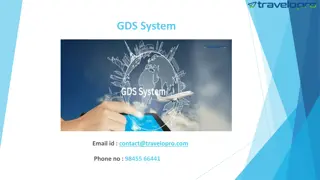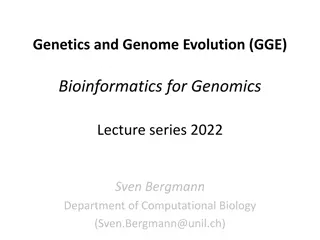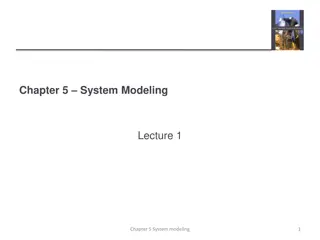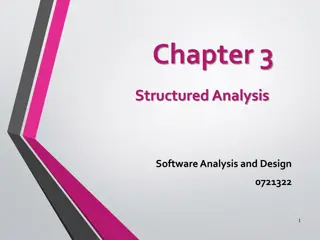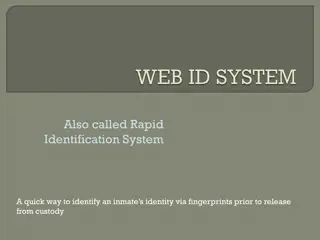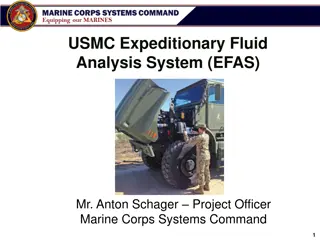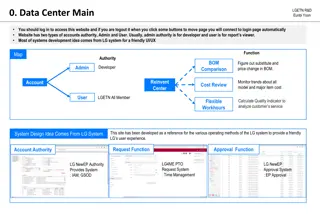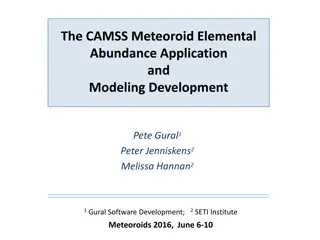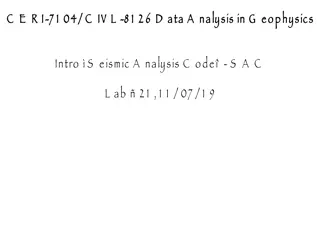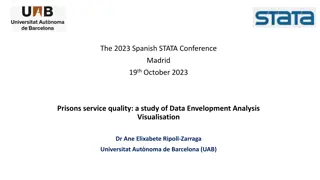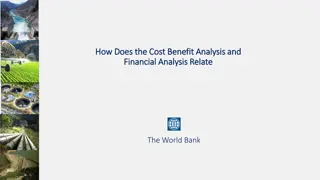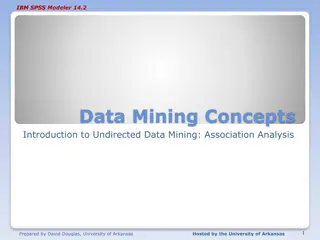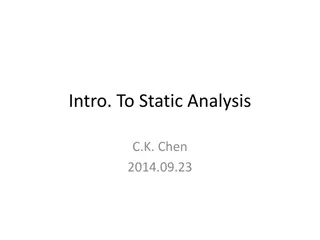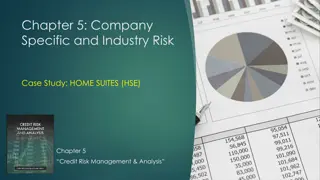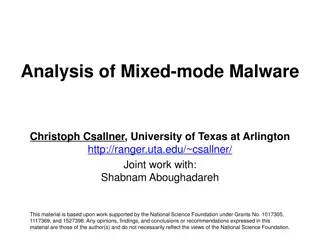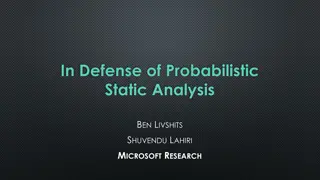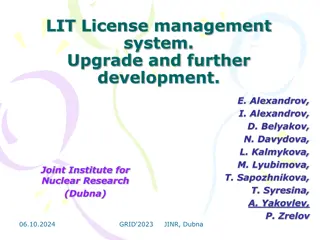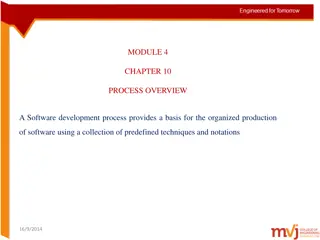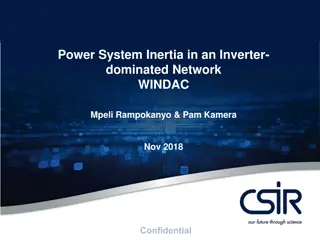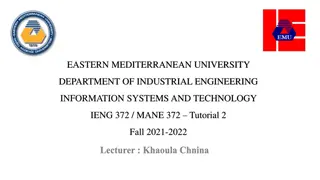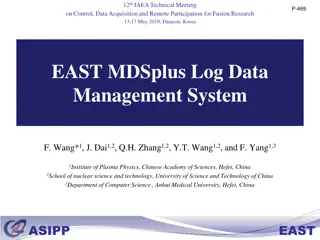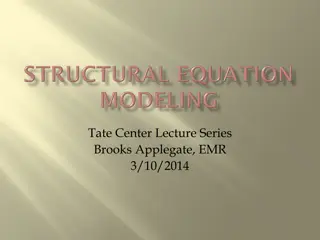Algorithm Analysis
Algorithm analysis involves evaluating the efficiency of algorithms through measures such as time and memory complexity. This analysis helps in comparing different algorithms, understanding how time scales with input size, and predicting performance as input size approaches infinity. Scaling analysi
1 views • 30 slides
Market Analysis (Project Formulation)
This detailed guide covers essential aspects of market analysis and project formulation in entrepreneurship, including feasibility analysis, techno-economic analysis, market demand analysis, steps in market analysis, and factors to consider for market demand analysis. Explore how to assess market de
2 views • 30 slides
System Models in Software Engineering: A Comprehensive Overview
System models play a crucial role in software engineering, aiding in understanding system functionality and communicating with customers. They include context models, behavioural models, data models, object models, and more, each offering unique perspectives on the system. Different types of system
5 views • 33 slides
Object-Oriented Analysis and Design Workflow
Object-Oriented Analysis (OOA) is a crucial step in software development to produce a logical model of the system's functionality. It involves requirements analysis, use case analysis, and use case realization to identify classes, responsibilities, attributes, and associations. The process includes
11 views • 90 slides
SBS Software and Analysis System Overview
The SBS Software and Analysis System at the University of Connecticut involves various repositories for offline and online analysis software tools, including libraries for digitization, simulation, and reconstruction. The system is coordinated by Andrew Puckett and supports GEANT4-based simulation f
0 views • 35 slides
Static Analysis Techniques Overview
Explore static analysis techniques such as syntactic analysis, dataflow analysis, and model checking. Understand the concept of basic blocks in static analysis and their boundaries. Dive into the opportunities provided by static analysis in summarizing program behavior without executing it.
9 views • 27 slides
GDS System
Travelopro Global Distribution System (GDS) is a computerized network system. It is a large computer network which is integrated with 100 of worldwide Airlines and consolidators for enabling transactions between travel agents and travel sites and also used by airlines, hotels, car rentals, railways
4 views • 15 slides
Bioinformatics for Genomics Lecture Series 2022 Overview
Delve into the Genetics and Genome Evolution (GGE) Bioinformatics for Genomics Lecture Series 2022 presented by Sven Bergmann. Explore topics like RNA-seq, differential expression analysis, clustering, gene expression data analysis, epigenetic data analysis, integrative analysis, CHIP-seq, HiC data,
1 views • 36 slides
Comprehensive Cost Management Training Objectives
This detailed training agenda outlines a comprehensive program focusing on cost management, including an overview of cost management importance, cost object definition, cost assignment, analysis, and reporting. It covers topics such as understanding cost models, cost allocations, various types of an
4 views • 41 slides
Single Entry System in Financial Accounting
Single Entry System is a simplified method used by small businesses to track their financial transactions. It lacks the rigor of double-entry bookkeeping and focuses on recording cash transactions and personal accounts. This system presents challenges in accurately determining profits and financial
0 views • 14 slides
Qualitative Data Analysis Techniques in Research
The purpose of data analysis is to organize, structure, and derive meaning from research data. Qualitative analysis involves insight, creativity, and hard work. Researchers play a crucial role as instruments for data analysis, exploring and reflecting on interview discussions. Steps include transcri
2 views • 27 slides
System Modeling in Engineering
System modeling in engineering involves developing abstract models to represent a system from various perspectives using graphical notations like UML. These models aid in understanding system functionality, communicating with stakeholders, and documenting requirements for new systems. Existing and p
5 views • 53 slides
Structured Analysis in Software Design
Structured analysis in software design aims to describe customer requirements, create a basis for software design, and define validatable requirements. Two main modeling philosophies, structured analysis, and object-oriented analysis are discussed. Structured Analysis Model Elements such as Data Flo
1 views • 44 slides
Rapid Identification System for Inmate Release
The Rapid Identification System, also called Rapid ID System, provides a quick way to verify an inmate's identity using fingerprints before release from custody. It allows law enforcement agencies, including IPD users under SDSheriff, to log in and access the system. By searching the San Diego AFIS
5 views • 8 slides
Sensitivity Analysis in Electric Power Systems
Sensitivity analysis in electric power systems involves examining the impact of parameter changes on system behavior. This lecture discusses linearized sensitivity analysis, matrix notation, injection shift factors (ISFs), and more, providing insights into system reliability and security. Concepts l
0 views • 43 slides
Marine Corps Expeditionary Fluid Analysis System (EFAS) Overview
The USMC Expeditionary Fluid Analysis System (EFAS) led by Mr. Anton Schager is a deployable, real-time fluid analysis system supporting Condition-Based Maintenance for Marine Corps ground equipment. It consists of two tiers - a ruggedized portable analyzer for tactical units and a benchtop analyzer
4 views • 12 slides
LG System Reference for User Experience Enhancement
This website serves as a reference for LG system operating methods, focusing on UI/UX enhancement, system design, account management, and error handling. It offers user and admin authorities for different functionalities like data analysis, system monitoring, and account approval. Users can sign up
1 views • 15 slides
System Sequence Diagrams: Understanding Artifact for System Behavior
System Sequence Diagrams (SSDs) are vital artifacts that visually illustrate input and output events related to a system. They help define system behavior and interactions, making them essential during the logical design phase of software applications. By depicting events in sequential order, SSDs o
3 views • 24 slides
CAMSS Meteoroid Elemental Abundance Application and Modeling Development
Cameras for All-sky Meteor Surveillance Spectroscopy (CAMSS) aims to obtain meteoroid elemental abundances through relative ratios and absolute atom counts, sampling from comets and asteroids. The system uses grating cameras with high resolutions to automate spectral analysis processes. The CAMSS Co
0 views • 14 slides
Introduction to Data Analysis in Geophysics with Seismic Analysis Code - SAC Lab 2.1
Explore the world of geophysics data analysis using the SAC Lab 2.1 code. Learn about seismic analysis, Fourier transform analysis, spectral analysis, color tracing, integration, differentiation, and more. The SAC online documentation provides valuable resources for users to delve deeper into this f
0 views • 45 slides
Data Analysis and Passage Analysis Project Proposal
This project proposal by Anthony Yang focuses on developing a Java program for data analysis and passage analysis. The motivation behind the project is to gain more knowledge in computer science and statistics-related topics while utilizing technology to extract useful insights from data. The propos
2 views • 8 slides
Efficiency Methodological Approaches in Prisons Service Quality Study
Exploring efficiency methodologies in analyzing prisons service quality, this study focuses on parametric and non-parametric approaches such as Data Envelopment Analysis (DEA) and Stochastic Frontier Analysis (SFA). It delves into benchmarking techniques, productivity analysis, and the implications
0 views • 21 slides
Fuel Cycle Analysis Toolbox: Enhancing Understanding and Optimization
This presentation focuses on the analyses and evaluations essential for assessing the potential of a fuel cycle, emphasizing different time scales, system sizes, objectives, and audiences. It discusses the need for coupled analyses, various tools required, and opportunities for improvement through i
2 views • 11 slides
The Relationship Between Cost Benefit Analysis and Financial Analysis
The intersection of cost benefit analysis and financial analysis is crucial for evaluating projects, with economic analysis focusing on incremental benefits and costs while financial analysis ensures sustainability. Perspectives like those of the government, utility manager, and private lender shape
0 views • 8 slides
An Alternative Phonetically-Based Phoneme Analysis of the Danish Consonant System
This study challenges the standard analysis of the Danish consonant system, proposing a new phonetically-based approach. It critiques the outdated standard analysis that links unaspirated plosives with semivowels, arguing that the alternative analysis is more in line with phonetic facts and easier t
0 views • 19 slides
Introduction to IBM SPSS Modeler: Association Analysis and Market Basket Analysis
Understanding Association Analysis in IBM SPSS Modeler 14.2, also known as Affinity Analysis or Market Basket Analysis. Learn about identifying patterns in data without specific targets, exploring data mining in an unsupervised manner. Discover the uses of Association Rules, including insights into
1 views • 18 slides
Introduction to Static Analysis in C.K. Chen's Presentation
Explore the fundamentals of static analysis in C.K. Chen's presentation, covering topics such as common tools in Linux, disassembly, reverse assembly, and tips for static analysis. Discover how static analysis can be used to analyze malware without execution and learn about the information that can
1 views • 54 slides
Transactional Analysis in Human Relationships
Transactional Analysis (TA) is a method developed by Eric Berne to analyze communication between individuals. It helps in understanding human relationships by categorizing interactions into different ego states like ID, Ego, and Super-Ego. TA provides valuable insights into personalities, aids in re
0 views • 52 slides
Comprehensive Credit Analysis Process for Risk Management
Explore the credit analysis process for effective risk management, covering aspects such as requested amounts, profitability analysis, collateral analysis, industry analysis, and both quantitative and qualitative analyses. Learn about the key parameters considered in establishing internal ratings an
0 views • 45 slides
Industrial, Microbiological & Biochemical Analysis - Course Overview by Dr. Anant B. Kanagare
Dr. Anant B. Kanagare, an Assistant Professor at Deogiri College, Aurangabad, presents a comprehensive course on Industrial, Microbiological, and Biochemical Analysis (Course Code ACH502). The course covers topics such as Industrial Analysis, Microbiological Analysis, and Biochemical Analysis. Dr. K
1 views • 16 slides
Analysis of Mixed-Mode Malware and Malware Analysis Tools
This analysis delves into mixed-mode malware, detailing its two phases and potential impact on malware analysis tools like TEMU. It explores scenarios where malware attacks analysis tools, emphasizing the challenges faced in observing and preventing malicious behavior. The study also highlights vari
0 views • 14 slides
Benefits of Probabilistic Static Analysis for Improving Program Analysis
Probabilistic static analysis offers a novel approach to enhancing the accuracy and usefulness of program analysis results. By introducing probabilistic treatment in static analysis, uncertainties and imprecisions can be addressed, leading to more interpretable and actionable outcomes. This methodol
0 views • 11 slides
Enhanced Mobile Ambulatory Assessment System for Alcohol Craving Studies
This Master's thesis defense presents an innovative system aimed at monitoring and predicting alcohol craving episodes in real-time. Motivated by the lack of reliable ambulatory assessment methods for alcohol craving studies, the thesis goals include enhancing a drinking craving Android application,
0 views • 43 slides
License Management System Upgrade and Development Overview
This project focuses on upgrading and enhancing the license management system at the Joint Institute for Nuclear Research in Dubna. It addresses challenges related to optimizing license usage through different types of licenses and monitoring systems. The system architecture includes components like
0 views • 18 slides
Software Development Process Overview
A software development process provides a structured approach for creating software using predefined techniques and stages such as system conception, analysis, system design, class design, implementation, testing, training, deployment, and maintenance. It involves stages like domain analysis, applic
0 views • 39 slides
Power System Inertia in Inverter-Dominated Networks
This study explores the impact of high levels of instantaneous inverter-based renewable energy penetration on power system inertia. It delves into fundamental concepts of energy balance, frequency control, load/frequency characteristics, and the importance of system inertia in maintaining grid stabi
0 views • 20 slides
E-R Diagram and Normalization Analysis for Online Telephone Sales System
This content provides detailed information on the creation of an information system for tracking orders in an online telephone sales company. It includes system requirements, entity identification, attribute listing, relationship identification, and normalization analysis for second and third normal
0 views • 10 slides
Strategies for Enhancing Extended Producer Responsibility System in Bulgaria
Korea-Bulgaria Knowledge Sharing Program focused on sharing strategies to enhance Bulgaria's Extended Producer Responsibility (EPR) system. The program discusses the current status, performance evaluation, issues, and recommendations related to the EPR system in Korea. It covers topics like beverage
1 views • 38 slides
Development of Log Data Management System for Monitoring Fusion Research Operations
This project focuses on creating a Log Data Management System for monitoring operations related to MDSplus database in fusion research. The system architecture is built on Big Data Technology, incorporating components such as Flume, HDFS, Mapreduce, Kafka, and Spark Streaming. Real-time and offline
0 views • 6 slides
Latent Variable Modeling in Statistical Analysis
Latent Variable Modeling, including Factor Analysis and Path Analysis, plays a crucial role in statistical analysis to uncover hidden relationships and causal effects among observed variables. This method involves exploring covariances, partitioning variances, and estimating causal versus non-causal
0 views • 59 slides






